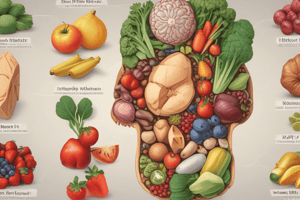Podcast
Questions and Answers
What is the primary function of carbohydrates in the human body?
What is the primary function of carbohydrates in the human body?
- Energy storage
- Hormone regulation and brain function
- Build and repair body tissues
- Energy source for the body (correct)
Which of the following macronutrients provides the most energy per gram?
Which of the following macronutrients provides the most energy per gram?
- Carbohydrates
- Fats (correct)
- Protein
- Fiber
What is the main characteristic that distinguishes micronutrients from macronutrients?
What is the main characteristic that distinguishes micronutrients from macronutrients?
- Presence in food
- Energy provision
- Amount required by the body (correct)
- Function in the body
Which of the following vitamins is fat-soluble?
Which of the following vitamins is fat-soluble?
What is the main function of protein in the human body?
What is the main function of protein in the human body?
What is the primary role of micronutrients in the human body?
What is the primary role of micronutrients in the human body?
What is a common effect of nutrient deficiencies?
What is a common effect of nutrient deficiencies?
What is a key consideration in diet planning?
What is a key consideration in diet planning?
What is a strategy for effective diet planning?
What is a strategy for effective diet planning?
Which of the following is an example of a micronutrient?
Which of the following is an example of a micronutrient?
What is a potential health consequence of nutrient deficiencies?
What is a potential health consequence of nutrient deficiencies?
Flashcards are hidden until you start studying
Study Notes
Macronutrients
- Provide energy and support growth and maintenance of body functions
- Three main categories:
- Carbohydrates:
- Provide 4 kcal/g of energy
- Found in grains, fruits, vegetables, and dairy products
- Main function: energy source for the body
- Protein:
- Provide 4 kcal/g of energy
- Found in meat, poultry, fish, eggs, dairy products, and legumes
- Main function: build and repair body tissues
- Fats:
- Provide 9 kcal/g of energy
- Found in oils, nuts, seeds, avocados, and fatty fish
- Main function: energy storage, hormone regulation, and brain function
- Carbohydrates:
Micronutrients
- Essential for maintaining optimal health, but required in smaller amounts
- Two main categories:
- Vitamins:
- 13 vitamins recognized by the human body
- Fat-soluble (A, D, E, K) and water-soluble (B, C)
- Important for energy metabolism, immune function, and growth
- Minerals:
- 15 minerals recognized by the human body
- Essential for maintaining fluid balance, nerve function, and bone health
- Examples: calcium, iron, potassium, zinc
- Vitamins:
Nutrient Deficiencies
- Occur when the body does not receive sufficient amounts of essential nutrients
- Can lead to various health problems, including:
- Fatigue and weakness
- Impaired immune function
- Poor wound healing
- Increased risk of chronic diseases
- Common deficiencies:
- Iron deficiency anemia
- Vitamin D deficiency
- Calcium deficiency
- Omega-3 fatty acid deficiency
Diet Planning
- Involves creating a personalized eating plan to meet nutritional needs
- Key considerations:
- Caloric needs: based on age, sex, weight, and activity level
- Macronutrient balance: balance of carbohydrates, protein, and fats
- Micronutrient intake: ensuring adequate intake of vitamins and minerals
- Food variety: including a wide range of whole, unprocessed foods
- Effective diet planning strategies:
- Meal planning: planning and preparing meals in advance
- Portion control: controlling serving sizes to maintain appropriate caloric intake
- Mindful eating: paying attention to hunger and fullness cues to avoid overeating
Macronutrients
- Provide energy and support growth and maintenance of body functions
- Three main categories of macronutrients:
- Carbohydrates: provide 4 kcal/g of energy, found in grains, fruits, vegetables, and dairy products, main function: energy source for the body
- Protein: provide 4 kcal/g of energy, found in meat, poultry, fish, eggs, dairy products, and legumes, main function: build and repair body tissues
- Fats: provide 9 kcal/g of energy, found in oils, nuts, seeds, avocados, and fatty fish, main function: energy storage, hormone regulation, and brain function
Micronutrients
- Essential for maintaining optimal health, but required in smaller amounts
- Two main categories of micronutrients:
- Vitamins: 13 recognized by the human body, fat-soluble (A, D, E, K) and water-soluble (B, C), important for energy metabolism, immune function, and growth
- Minerals: 15 recognized by the human body, essential for maintaining fluid balance, nerve function, and bone health, examples: calcium, iron, potassium, zinc
Nutrient Deficiencies
- Occur when the body does not receive sufficient amounts of essential nutrients
- Can lead to various health problems, including:
- Fatigue and weakness
- Impaired immune function
- Poor wound healing
- Increased risk of chronic diseases
- Common deficiencies:
- Iron deficiency anemia
- Vitamin D deficiency
- Calcium deficiency
- Omega-3 fatty acid deficiency
Diet Planning
- Involves creating a personalized eating plan to meet nutritional needs
- Key considerations:
- Caloric needs: based on age, sex, weight, and activity level
- Macronutrient balance: balance of carbohydrates, protein, and fats
- Micronutrient intake: ensuring adequate intake of vitamins and minerals
- Food variety: including a wide range of whole, unprocessed foods
- Effective diet planning strategies:
- Meal planning: planning and preparing meals in advance
- Portion control: controlling serving sizes to maintain appropriate caloric intake
- Mindful eating: paying attention to hunger and fullness cues to avoid overeating
Studying That Suits You
Use AI to generate personalized quizzes and flashcards to suit your learning preferences.




